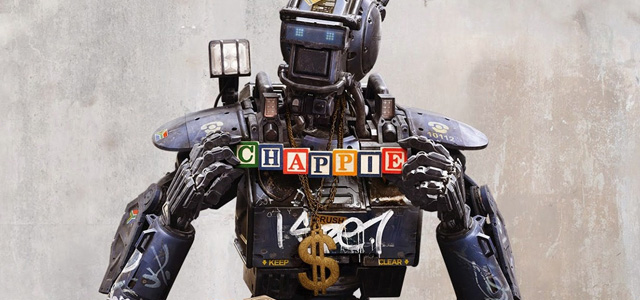(MA15+) Starring: Hugh Jackman, Dev Patel, Sharlto Copley, Sigourney Weaver
Writer-director Neill Blomkamp’s debut District 9 was a groundbreaking and unique sci-fi event. But his second film, Elysium, struggled to create the same cinematic magic. His latest film, Chappie, is another sci-fi outing set in Blomkamp’s vision of the future — crime-filled and violent. Another notable feature of the future, on this occasion, is people also make bad hair choices. Still, what seems to have been a good choice in the future is the use of robots by Johannesburg’s police department. The crime rate has dropped, thanks to these robocops.
During the successful development of this new level of technology, Deon Wilson (Dev Patel) — the creator of this robotic army — develops a new program that will develop a conscience in the robots. Deon is a man before his time and determines he must hide his new creation, Chappie. In the process of hiding his unique invention, the misunderstood robot is stolen by a small-time crime trio. They manage to take advantage of his newfound self-awareness, innocence and loyalty. They train Chappie for a life of crime. During his initiation process, key forces of industry, crime and law enforcement are searching for this unique robot. The goal of these forces is to exploit him — or destroy him. The little robot must learn quickly about the evils of the world, as well as how to protect himself and everyone who is within his sphere of influence.
Due to his upbringing in South Africa, Blomkamp paints a picture of society that is filled with racism and segregation. District 9 gave a fresh spin on these issues and introduced a central character that must grow beyond these issues through an external and internal metamorphosis. This character development made up for District 9’s plot holes and weaker story components. Chappie, though, ultimately suffers from comparison with District 9 and similar “self-aware robot” stories such as Blade Runner, I, Robot, and Robocop.
Blomkamp seems to be aiming for some originality with Chappie, but it doesn’t go much further than this robot becoming a gangster with a South African accent. District 9’s leading man Sharlto Copley is the voice of Chappie but his welcomed presence cannot make up for how all the other characters are poorly chosen. They lack believability, whether it’s in terms of their being evil, humorous or endearing. This extends across the whole film, from the unappealing trio of gangsters who “raise” Chappie, to Hugh Jackman (X-Men) as the mulleted villain, and Sigourney Weaver as the most incompetent CEO in cinema history. If Blomkamp desired for viewers to dislike the human characters and only find appeal in the robots, he succeeded.
The dialogue was difficult to follow and the story was exceptionally disjointed. Worthy of special acknowledgment, though, are the special effects. The line between actual actors and the CGI players was fascinating to observe. But despite such visual wonders, there is not much in Chappie to breathe life back into such an overused storyline.
If there is any salvation for this film, it would be in its raising of some of life’s bigger issues. The story opens the door to dialogue on creation, evolution, God, human nature, death and the “blank slate” theory. Chappie includes many opportunities to consider these topics, but it is marred by excessive violence and language. If it is possible for you to get past these issues, there is a treasure trove of things to discuss. Besides the robotics creator, Deon, most of the characters in this on-screen journey do not realise the gift they have been given in Chappie. The same could be said about the audience experience.
If you choose to see Chappie, take time to consider the golden opportunities for rich discussion that this poorly executed film provides.
Leaving the cinema…
Deon Wilson says to Chappie: “You’ve taught us more than we could have ever imagined.” But I could list off a multitude of films that have done a better job with this robotic story line. But taking time to consider the film, Chappie does open the door to many ideas. Don’t miss out on the opportunity to stretch yourself and consider the questions that Chappie is asking.
What are the bigger questions to consider from this film?
- What does it mean to be human? (Genesis 1:27, 2:5-25)
- Why are humans suspicious and violent? (Genesis 3, Matthew 15:19)
- Can mankind create artificial conscience?
Russell Matthews works for City Bible Forum Sydney and is a film blogger














